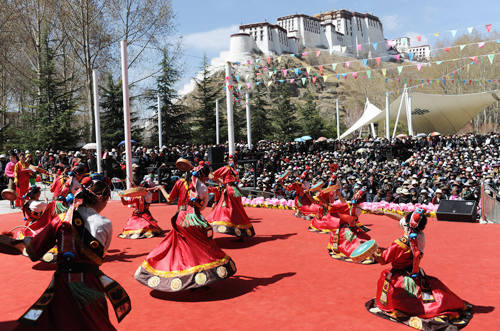|
 |
|
GRAND CELEBRATION: People in Tibet Autonomous Region celebrate the Serfs Emancipation Day in Lhasa on March 28 (WEN TAO) |
The 2012 Tibetan New Year has just passed, and it has been already half a year since the Dalai Lama clique's new "head" took office. This ambitious young man gave a speech on March 10, saying that "blessed by the historic transfer of political power, appointed by the people, supported by Tibetans living in Tibet, I am proud to say the Central Tibetan Administration (CTA) has the legitimacy to represent 6 million Tibetan people and work for their interests." This was something even the Dalai Lama never dared to say.
Since "legitimacy" was mentioned by him, let us first talk about the "legitimacy" of the "CTA," the new name adopted by the so-called government in exile under the leadership of the 14th Dalai Lama.
Tibet has remained under the jurisdiction of China's Central Government since the mid 13th century. The Central Government offered the local government in Tibet the legitimacy to administrate the region. Meanwhile, the Tibetan local government had to accept Central Governments' administrative management and fulfill all obligations of local governments. Evidence of China's Central Government's administrative jurisdiction over the Tibetan local government can be found in numerous historical files, documents, stamps or tablet inscriptions in both Chinese and Tibetan languages, as well as various cultural relics.
After the People's Republic of China was founded in 1949, under the framework of the Constitution and the basic political system, regional ethnic autonomy is conducted in Tibet. The People's Congress of the Tibet Autonomous Region and the Autonomous Region Government enjoy various rights endowed by the Constitution and laws. The legitimacy of the Autonomous Region Government is clearly defined by law.
General elections were first staged in Tibet in 1961. The deputies to people's congresses at various levels are elected by local people. Since the Tibet Autonomous Region was set up in 1965, the eight chairmen of the Tibet Autonomous Government have all been Tibetans. For the past 50 years, a lot of Tibetan cadres have been trained, many in important positions used to be serfs and slaves in old Tibet. Since China adopted the reform and opening up policy in the late 1970s, the quantity and quality of Tibetan cadres have greatly improved.
On the contrary, the separatist clique in Tibet fled away from Tibet in 1959 after their riot failed and set up the so-called "government in exile," which has neither been recognized by China's Central Government, nor by any other country's government. On May 28, 2011, the so-called "14th Tibetan National Congress" passed "the Constitution of the Government in Exile Amendment", renaming the "government in exile" as "CTA." The CTA has no legitimacy at all. If it is used to represent the 6 million Tibetans, it can only be a laughing stock.
What kind of person is this new "head" of the Dalai Lama clique? The election of this new leader received support and aid from organizations in the United States. At first, the Dalai Lama openly expressed his doubts about this "new head," but finally he had to support him, at least on the surface. There are two major reasons: One is that the Dalai Lama has to obey the Americans; the other reason is, when a young person without any religious or family background is elected, the Dalai Lama at his own will hopes that this young man will help to appease long-lasting family, religious and regional conflicts among exiled Tibetans. However, this "new head," a Harvard graduate, who had been a member of the radical separatist organization "Tibetan Youth Congress" for many years, lacks knowledge of China's national condition, Tibet and other areas in China inhabited by Tibetans.
In his "inaugural speech" in 2011, he quoted a line of the inscriptions of a Tang Dynasty (618-907) tablet at the Jokhang Temple in Lhasa, trying to say that Tibet is independent from the central authority of China. But he misinterpreted the inscriptions. The line he quoted actually emphasizes the importance of national unity and the Tibetan people's appreciation of the stability and peace produced by national unity.
Since his election, many media comments believe that he will face a lot of unavoidable embarrassment. For example, he lacks support among exiled Tibetans, particularly the support of the traditional religious and cultural background. The indifference of China's Central Government toward him makes it impossible for him to reach the Central Government. The international community's wait-and-see poise narrows his activity space and influence. In order to break this plight, it's no surprise to hear him bragging in his March 10 speech.
For many years the Central Government of China has been trying to persuade the Dalai Lama and people around him to keep up with the times and the trend of history. While claiming they represent Tibet, and trying to win foreigners' sympathy by telling lies, they can only guide hundreds of thousands of overseas Tibetans to a wrong way. The prosperity and stability Tibet enjoys today is the result of the joint efforts and unity of all ethnic groups in China.
Any attempt to separate Tibet from China and harm the nation's integrity goes against the interests of all Tibetan people. The strong and prosperous motherland and a developing Tibet is the best support for Tibetans at home and abroad.
The author is a researcher with the China Tibetology Research Center in Beijing
Email us at: zanjifang@bjreview.com | 